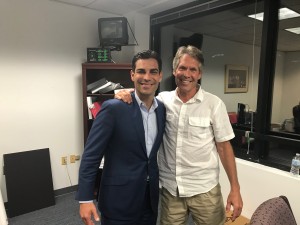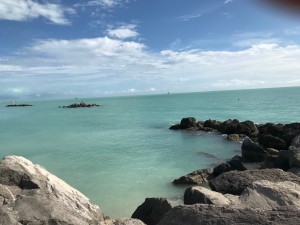“We stand now where two roads diverge. But unlike the roads in Robert Frost‘s familiar poem, they are not equally fair. The road we have long been traveling is deceptively easy, a smooth superhighway on which we progress with great speed, but at its end lies disaster. The other fork of the road — the one less traveled by — offers our last, our only chance to reach a destination that assures the preservation of the earth” [and ourselves]. – Rachel Carson
Let’s cut to the quick, the vast majority of climate scientists as well as Republicans and Democrats in the House Climate Solutions Caucus and a majority of Americans agree that the science is clear: our climate is changing, it’s happening now, and it’s being exacerbated by our addiction to burning polluting fossil fuels. And as our planet continues to heat up, we are witnessing:
- More frequent and devastating storms and floods
- Increasingly long drought
- Glaciers melting at record paces
- Rising sea levels
- Exploding economic costs (2017, for example, shattered records with 306 billion in damages from climate-linked disasters – see Forbes article).
Through burning dirty fossil fuels, we are dumping 110 million tons of man-made global warming
pollution into the atmosphere every 24 hours. That number is too big and too cerebral to visualize and understand. So, picture an atomic bomb exploding – and now imagine 500,000 (half a million) atomic bombs exploding every 24 hours. That’s the equivalent amount of excess heat energy we are dumping into our precious, life-giving atmosphere every day. And this fossil fuel-driven pollution is warming the temperature of our planet and disrupting the health and future of our economy, environment and children’s lives.
Let’s not despair, however, for despair creates inaction at a time when we need urgent action. Yes, the problems we face are big, but the solutions are BIGGER and there is good news: we can choose to limit rising temperatures and avert the worsening impacts of climate change by switching from polluting fossil fuels to clean, renewable energies like solar and wind coupled with energy conservation and the emerging new field of energy storage technology. We have the knowledge, skills, and technology to do it, and today we can do it at the same cost (or cheaper) than burning fossil fuels. We can help our environment while reducing pollution and saving costs. That is a sensible nonideological win, win.
And large numbers of us want a healthy environment. According to a 2017 Pew Research Center survey, 74% of U.S. adults said “the country should do whatever it takes to protect the environment.” A 2017 Yale study found that 63% of Americans are worried about climate change. People care about the health and well-being of their children. Republicans and Democrats, Independents and Greens all want their children to grow up in a healthy world free of pollution – including the effects of climate change.
So, how do we build the bipartisan support needed to implement sensible solutions to climate
change? Let’s take a look at several seeds of hope that provide a path toward responsible climate solutions. As CELL is currently completing Climate Action Now (CAN) programs in Miami, Florida, we are highlighting three local politicians who are seeing, up close and personal, the impacts of climate change in rising sea levels flooding the streets of cities and towns along the Florida coast. These pragmatic politicians don’t see climate change as a red or blue issue; they see it as a real problem happening today that will continue to worsen if we don’t take immediate action to solve it. And consequently, they are taking leadership roles in promoting rational bi-partisan climate action.
Republican Congressman Carlos Curbelo of South Florida, along with Florida Democratic Representative Ted Deutch, co-founded the Climate Solutions Caucus (CSC) – a group of bipartisan Representatives (35 Republicans and 35 Democrats) working in Washington to advance common solutions to the risks of climate change. The Climate Solutions Caucus, with help from the Citizens Climate Lobby, is advancing sensible policy and action on climate and is a beacon of hope for spurring climate dialogue and legislation. With our Congress dysfunctionally divided along partisan lines, Curbelo, Deutch and other courageous members of the CSC are offering responsible, grounded solutions to the threats of global warming and a path to working together to implement them.
Philip Stoddard, Democratic mayor of South Miami, is a full-time biology professor at Florida International University, and one of our nation’s greenest mayors. He lives in a home powered by solar panels and drives a Nissan Leaf electric car charged by the extra power he generates from the sun. Stoddard recognizes the immediate threat that climate change and sea level rise pose for his constituents in south Florida. He has stated that “there’s no keeping the water out” and that rising sea level will eventually force Miami to depopulate. He is working to make his city as green and resilient as possible – encouraging residents to put solar on their houses as most of South Miami’s roofstock is residential. He also worked to pass an ordinance requiring solar on new single-family residential construction. He sees the real impacts of climate change and sea level rise through a clear lens of pragmatic problem solving. To read more about Philip’s climate leadership, check out this article: How a Florida biologist became one of America’s greenest mayors.
Francis Suarez, the newly elected Republican mayor of the City of Miami captured 85% of the vote in a campaign that focused on issues of concern to voters (not divisive partisan rhetoric). Suarez has also identified the threats of climate change and sea level rise and the opportunity for Miami to become one of the most resilient cities in the world. Climate change and sea level rise is also a practical issue for Mayor Suarez. Miami streets are regularly flooding with King Tides. This has become the new normal (see this video of streets flooding in Miami Beach).
Mayor Suarez’s campaign sounded a chord with voters who were tired of the divisive partisan politics in Washington and ready to elect someone who focused on a commitment to solving local problems. Politics in the U.S. today appears clearly divided along party lines. Yet most Americans agree on a surprisingly large number of issues from how we view democracy to the federal tax system, from immigration to health care, from education and infrastructure spending to widespread support of action on the environment, including climate change (see article “12 Issues Most Americans Agree on…”).
I had the opportunity to interview Mayor Suarez in January 2018 and asked him “How do we get Republicans and Democrats together to have a real conversation about climate change?” He immediately quipped: “Put a mayor in the room.” He further added: “It’s the beauty about being a mayor, we don’t look at the world that way [through a partisan lens]… Mayors look at the world differently; they look at the world in terms of problems and solutions, not right/left, not Republican/Democrat. So, when we have problems, we need solutions. Our residents are expecting that and you get it from all levels: from the small business owner to a small home owner to our high-end business community – there is a diversity of people who have brought this issue to my attention… When we focus on the economics of the issue, it becomes non-partisan. If insurance companies, for example, say they don’t want to insure Miami [due to risks of sea level rise], that has an economic impact…” To listen to the unedited interview with Mayor Suarez, click the audio recording below:
Over 7,500 cities representing approximately 700 million people and 10% of the total world population have signed on to the Global Covenant of Mayors for Climate and Energy. To learn more about the growing climate leadership role mayors are playing globally, check out this link. To learn more about how U.S. mayors are taking a leadership role on climate action, check out this link.
It is heartening to know, that given the political stalemate in Washington, D.C., that mayors and other elected officials are taking leadership roles and action on climate change – action that is in the best interest of our economy, our environment, and the health of our children.
What can you do to support this work? Three easy, quick things and an invitation: First, contact your Congressional Representative and ask her/him to join the Climate Solutions Caucus
(remember this is a bi-partisan group of Republicans and Democrats). If they are already a member, thank them for their work and tell them you will remember this when they come up for reelection. Second, contact your two Senators and ask them to work with their colleagues to form a complementary Climate Solutions Caucus group in the Senate. Third, contact your mayor and ask her/him to join the Global Covenant of Mayors for Climate and Energy. Don’t underestimate the power of your voice. When representatives hear from concerned citizens about issues they deeply care about, especially in large numbers, they respond. Finally, join the Citizens Climate Lobby and work with a team advancing a respectful, non-partisan approach to climate action. To find a local CCL chapter near you, check out this link.
Thomas Jefferson said: “Do you want to know who you are? Don’t ask. Act! Action will delineate and define you.” Action is a proven antidote to sadness and despair and is part of our responsibility to be engaged citizens. It empowers us and gives a sense of hope and agency to our lives. And when we join with others in creating a movement, we become the architects of our nation’s future and to this thing we call democracy.
Stay tuned: Our next blog will focus on “A Sense of Wonder.”
If you’re looking for inspiration of what can be achieved when politicians and community groups work together, please read this case study of the Lammas Eco-Village in Wales, UK.
To subscribe to (or unsubscribe from) these blog posts, write to jonathan@cellonline.org.
*CELL is currently accepting applications for college sustainability focused study abroad programs, to Iceland, Central America, Ecuador, and Scotland. Faculty may contact CELL regarding custom programs for your college. Go to cellonline.org for more information and to apply.”





